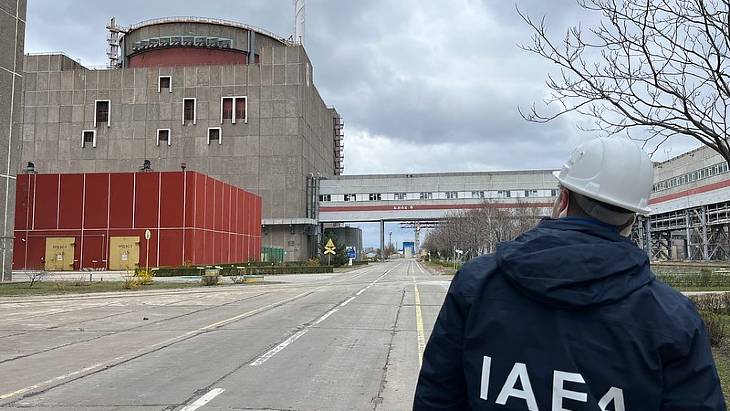In its latest update on the situation at what is Ukraine and Europe's largest nuclear power plant, and which has been under Russian control since March 2022, the IAEA said that the steam generated from the one unit - currently unit 5 - in hot shutdown, is used "for various nuclear safety purposes including the processing of liquid radioactive waste collected in storage tanks".
The State Nuclear Regulatory Inspectorate of Ukraine issued regulatory orders last month for all six units to be placed in cold shutdown, given its situation on the frontline of the war, and the breaching of the dam that had helped ensure plentiful cooling water supplies.The Russian operators of the plant say such a move is not required from a "legal or technological point of view" and the IAEA said the plant's operators are currently preparing to move unit 4 from cold shutdown to hot shutdown, after which unit 5 will be placed in cold shutdown "to carry out preventative maintenance activities that are only possible in cold shutdown".
The IAEA added that its experts stationed at the plant "are strongly encouraging the ZNPP to investigate all possible options to install an external boiler to generate the steam required, which would enable the site to bring all units into a cold shutdown state".
IAEA Director General Rafael Mariano Grossi gained United Nations approval for five basic safety principles for Zaporizhzhia in May. They include agreement that there should be no attack on the plant, no attack from the plant and that it should not be used as a storage base for heavy weapons.
The plant is sited on the frontline of Russian and Ukrainian forces and was affected by shelling on a number of occasions in the first few months of the conflict with both sides blaming the other. There have been IAEA experts stationed there since September 2022, although their presence has not stopped external power to the plant being cut off for short periods of time as a result of military action outside the immediate area of the plant.
In his update, Grossi said the "nuclear safety and security situation remains very precarious" and said the agency staff had continued to inspect parts of the plant, without seeing any mines or explosives "but are still waiting to gain the necessary access to the rooftops of reactor units 3 and 4 following recent reports that explosives may have been placed there".
In recent days the IAEA experts reported hearing "a series of explosions apparently taking place some distance away from the ZNPP, but still a stark reminder of potential nuclear safety and security risks facing the facility during the military conflict in the country".
The IAEA team also reported that the levels of the nuclear power plant's cooling pond, and the discharge channel of the nearby thermal power plant, had remained "relatively stable, with the water level decreasing by 1-2 centimetres per day due to usage and evaporation. The site continues to have sufficient water for some months".
The IAEA reported that there are plans to construct additional wells at the site "that could be used to replenish essential cooling water for the sprinkler ponds which are currently utilising underground water pumped from the site's drainage system". The agency's update added that it was requesting "better accommodation, living and working conditions" for its staff at the plant.





_53504.jpg)

_13505.jpg)
_87975.jpg)






